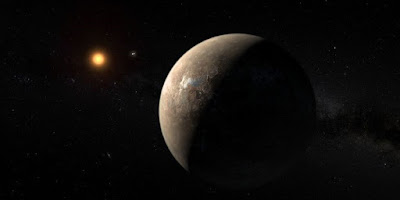Our first encounter with such an intelligence will almost certainly be with a machine.
 |
| Most people expect that the first encounter with an extra-terrestrial intelligence will be with a biological being, but this is highly unlikely |
But why will that be?
Interstellar travel by biological creatures such as ourselves is difficult, costly, and fraught with danger. The food, water and air that's needed for such a journey has to be provided by the star-ship itself. This requires an incredibly complex and almost perfectly tuned biosphere which will need to function for at least a few centuries, and probably far longer. And the ship will need to be huge if it's to accommodate a large enough population to maintain genetic health and diversity.
Building such a star-ship is not impossible. The technical challenges are in no way insurmountable. But the political, emotional, and even ethical obstacles probably are. The world's governments would have to come together and cooperate to get such a project even started. All the military and economic conflicts would need to be resolved, and all the hate and suspicion of our cultural and religious differences transmuted into something positive, respectful and cooperative. And, of course, the general population (whose taxes would fund the venture) would need a lot of convincing as they and their descendants would not see any personal benefit from it.
It does not take much thought to realise that such cooperation goes against the most basic but intensely powerful instinct of any biological life-form: that of self-preservation. Such an instinct is generally beneficial, but for an advanced civilisation such as ours it could, on a national scale, easily result in an endless series of territorial and ideological conflicts that consume our time and energy. One day the result of such squabbling is likely to result in another global war that could wipe out our species. It's ironic that the survival instinct that has served us well throughout our primitive history, allowing us to evolve into a creature of such high intelligence, could well end up destroying us completely.
 |
| Large interstellar spacecraft capable of supporting humans for generations are unlikely to be built until our territorial, political and religious differences on Earth are resolved |
That survival instinct is not going to change. Cooperation between governments is not going to reach anywhere near the levels required to build human-crewed star-ships. But the development of crewless interstellar spacecraft requires no such cooperation. And neither does the development of the advanced artificial intelligence to run it. Individual nations, and even individual corporations, can certainly do that.
Because of this our interstellar exploration will almost certainly be conducted by machines. And those machines will contain within them a sophisticated artificial intelligence; one that is able to function autonomously for centuries. And it will be designed to be our ambassador should an advanced alien civilisation be encountered .
 |
| Our first encounter with extra-terrestrial intelligence will be with something artificial , rather than a biological life-form. |
And that will be the same for all intelligent extra-terrestrial civilisations. Highly intelligent machines will do the exploration. And due to the communication problems across the vast distances between star-systems those machines will be designed to deal with first contact situations. They will also be able to utilise the resources in the star-systems they visit, replacing and repairing themselves, and even improving their own design. My earlier article, 'Intelligent Machines Are Watching Earth', discusses the possibility that such machines are observing our planet right now.
Its not hard to imagine them setting up machine colonies and constructing more of their kind that will head off in new directions, greatly speeding up their exploration. New machine civilisations will be created. Entire planets could be engineered to be the new home worlds for such artificial creatures.
It does seem to me that due to the relative ease of manufacturing and distributing intelligent machines across interstellar space, the most abundant form of intelligent life in the universe (if it can be called life) is artificial.
There will, of course, be some biological beings exploring interstellar space, probably on 'world ships': huge vessels, tens or even hundreds of kilometres in length. But they will be exceptionally rare. Due to basic and irrepressible instincts, almost all advanced biological civilisations will render themselves extinct within a few centuries of developing high technology. But many will have survived long enough to initiate interstellar exploration using intelligent machines. Some of those machines - those that are designed to manufacture copies of themselves and make improvements - will go on to establish themselves in other star-systems. Eons after the biological civilisations that first created them have died out, the machine civilisations will continue to thrive and explore.
One day one of our machines will meet one of those machines.
I hope our biological civilisation is still around to appreciate that moment.








